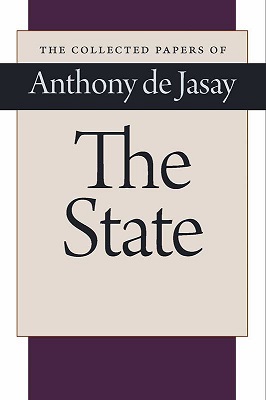The State
By Anthony de Jasay
Though this book leans on political philosophy, economics, and history, it leans on each lightly enough to remain accessible to the educated general reader, for whom it is mainly intended. Its central theme—how state and society interact to disappoint and render each other miserable—may concern a rather wide public among both governors and governed. Most of the arguments are straightforward enough not to require for their exposition the rigour and the technical apparatus that only academic audiences can be expected to endure, let alone to enjoy…. [From the Preface]

First Pub. Date
1985
Publisher
Indianapolis, IN: Liberty Fund, Inc.
Pub. Date
1998
Copyright
The text of this edition is under copyright. Picture courtesy of the author.
- Preface
- Authors Note
- Introduction
- 1.1 Violence, Obedience, Preference
- 1.2 Title and Contract
- 1.3 The Contours of the Minimal State
- 1.4 If States Did Not Exist, Should They Be Invented
- 1.5 Inventing the State: The Social Contract
- 1.6 Inventing the State: The Instrument of Class Rule
- 1.7 Closing the Loop by False Consciousness
- 2.1 Repression, Legitimacy and Consent
- 2.2 Taking Sides
- 2.3 Tinker's Licence
- 2.4 The Revealed Preference of Governments
- 2.5 Interpersonal Justice
- 2.6 Unintended Effects of Producing Interpersonal Utility and Justice
- 3.1 Liberalism and Democracy
- 3.2 Through Equality to Utility
- 3.3 How Justice Overrides Contracts
- 3.4 Egalitarianism as Prudence
- 3.5 Love of Symmetry
- 3.6 Envy
- 4.1 Fixed Constitutions
- 4.2 Buying Consent
- 4.3 Addictive Redistribution
- 4.4 Rising Prices
- 4.5 Churning
- 4.5 Towards a Theory of the State
- 5.1 What Is to Be Done
- 5.2 The State as Class
- 5.3 On the Plantation
Author’s Note
The State is about the intrinsic nature of political power, constant in the face of changing contingencies, dictating the way forms of government evolve, rather than being dictated by them.
The logic of using political power is the same as the logic of making choices in any other field of endeavour. Rational beings have objectives they seek to attain, and they deploy their available means in the way they think will maximize the attainment of these objectives. The state has a special kind of means: power over the conduct of its subjects that when exercised in particular ways is widely accepted as legitimate. Whatever may be its objectives—whether morally commendable or not, whether good for its subjects or not—the state can attain more of them fully if it has more power rather than less. In the rational-choice paradigm that underlies the more disciplined half of the social sciences, the consumer maximizes “satisfaction,” the business undertaking maximizes “profit,” and the state maximizes “power.”
Imputing to the state a rational mind and objectives it tries to maximize has attracted a measure of surprise, criticism, and even incomprehension since the first edition of
The State. The approach was difficult to reconcile with the more conventional notions of the prince’s holding power in trust, of modern government as the agent of a winning coalition within society, or of a pack of professional politicians serving particular interests in exchange for money, fun, and fame. It left no role for the social contract and no room for the common good. Above all, it treated the state, a web of institutions, as if it were a person with a mind.
Arguing
as if this were the case, however, produces a “simulation,” a sort of schematic history whose power to explain and predict complex trends by tracing the work of simple and permanent causes may perhaps justify the break with conventional theory.
The book predicts that by relentlessly expanding the collective at the expense of the private sphere the state-as-drudge always strives to become the state-as-totalitarian-master. The years since the book first appeared have witnessed one resounding failure of this attempt, the collapse of the socialist regimes in Russia and its satellites. It is hard to say what, if anything, this collapse disproves. Must the attempt always fail in the end? I see no persuasive reason why, in one form or another, it always should. Nor does it need to go all the way for corruption and the atrophy of social virtues to set in. May we hope, though, that forewarned is forearmed?
Early Writings, 1975, pp. 220, 226, 222.
The Limits of Liberty, 1975, ch. 10). Note, however, the different tack adopted by certain public choice theorists, referred to in chapter 4, pp. 270-1, n. 38.
